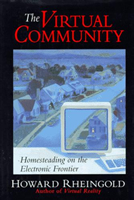Community Management is Not New
 There is a problem that I’ve found with a good number of people who refer to themselves as online community managers, builders or professionals. They dismiss, choose to ignore and, in general, don’t really respect what came before them, most of which is still relevant to this day.
There is a problem that I’ve found with a good number of people who refer to themselves as online community managers, builders or professionals. They dismiss, choose to ignore and, in general, don’t really respect what came before them, most of which is still relevant to this day.
That’s a mistake. And it is what separates a poor or mediocre community manager from a good one. It is the difference between having perspective and being short sighted.
Online community isn’t new. As such, community management is not new. I’ve been managing online communities, hands on, for 12 years. Moderating even longer than that, into the late 1990s. But, online community has existed much longer.
Do you know what The WELL is? Info-Mac? Have you ever heard of Howard Rheingold? Moving into the 1990s, what about Gail Ann Williams? Rebecca Newton? Derek Powazek? Amy Jo Kim?
The WELL is a pioneering online community that launched in 1985. Info-Mac did the same in 1984. That is the year I was born! Rheingold, an early member of The WELL, is credited with coining the term “virtual community” and, in 1993, authored “The Virtual Community,” a highly influential book. Williams was involved with The WELL, as a member of staff, for over 20 years. Newton, Powazek and Kim have all been involved in the space since at least the mid-90s. Powazek wrote “Design for Community.” Kim wrote “Community Building on the Web.”
I haven’t read Rheingold’s book. But, I was recently reminded of it and I bought it on Amazon. It arrived yesterday and I plan to read it. I am not a historian. I don’t pretend to be an expert on the history of this space, especially when you get into anything prior to the mid-90s. The list of people I mentioned above is meant to illustrate a few examples, not be all-inclusive. I am sure it is missing some great people. Please mention them in the comments.
My point is that, if you really care about being great at this profession and understanding online community, it is important to understand that people came before you and to educate yourself if you can. That’s my goal, with Rheingold’s book. Expanding your understanding doesn’t make you weak, it makes you strong. For some people, to admit this is a weakness, as if they are no longer the greatest community manager in the world. That’s insecurity. It limits you.
Let me say, I am very confident in my abilities and my experience. I feel comfortable discussing online community with anyone and believe I will be able to hold my own. I have put in the time to build that confidence. But, what separates the confident individual from the arrogant one is when you fail to acknowledge, respect and pay tribute to what came before you. For example, I may not have read Rheingold’s work, but I have heard his name enough from people I respect to know that he deserves my respect. Part of the reason that I am confident in my own abilities is that I am always learning from what others have done. To fail to do so is to put yourself in a very isolated, dangerous place.
I encounter more and more community “managers,” “builders” and “professionals” who lack perspective. Whether it is “forums” being “dead,””online community” only being a handful of social networks or something else, it is all short sighted. There are two big ways to gain perspective. The first is experience. Time spent doing. The second is education. And that’s what I implore you to do. Educate yourself. Look back. Understand that there are people who came before you who helped carve out and create the role that you are now in. Learn from them and respect them.
